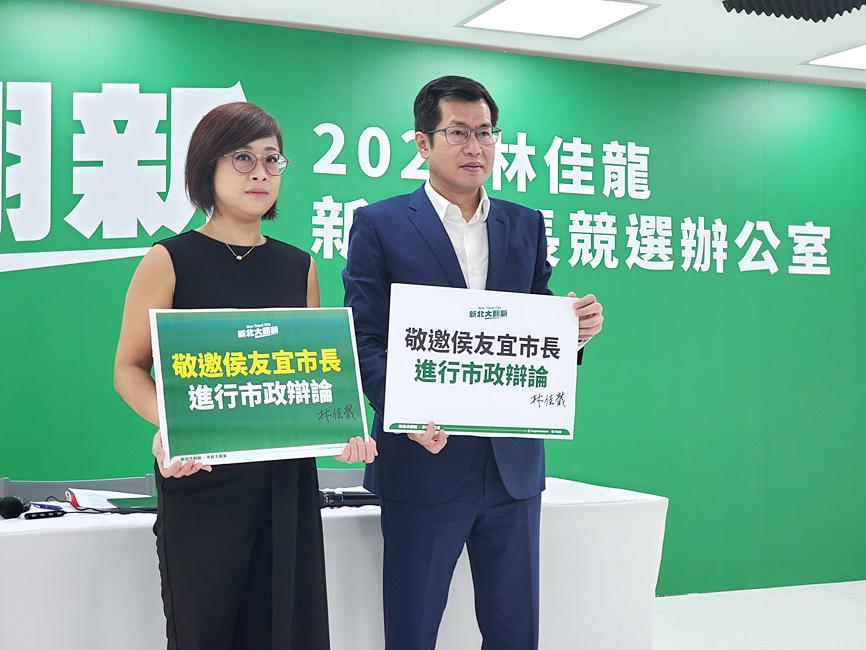Democratic Progressive Party (DPP) lawmakers yesterday said they suspect that Chinese Nationalist Party (KMT) Vice Chairman Andrew Hsia (夏立言) has a “hidden agenda” to meet secretly with top officials in Beijing during a planned trip, while other parties accused Hsia and other KMT members of “collaborating” with an enemy state.
DPP Legislator Lo Chih-cheng (羅致政) and fellow party members said that the KMT is “colluding” with China instead of voicing support for Taiwan as Beijing undermines regional peace and security.
“The KMT is pandering to Beijing leadership and kowtowing while an enemy strikes at Taiwan’s doorstep,” Lo said at the legislature in Taipei.

Photo: CNA
Lo, a member of the Foreign Affairs and National Defense Committee, said that the KMT has “a secret political agenda” and is deceiving the public by saying that the China visit is “not political.”
“Will Hsia’s delegation hold a meeting with Chinese government officials?” he asked.
“The KMT said they have no such plan, but would attend arrangements made by the hosts, which suggests that they have the hidden agenda and are concealing meetings with Chinese officials,” Lo said.
He also said that Hsia’s delegation should voice protest against Beijing’s military exercises in waters around Taiwan if they meet with officials.
Lo also said that Hsia’s delegation should challenge China’s recent white paper, titled The Taiwan Question and China’s Reunification in the New Era, which contradicts the KMT’s position on a “one country, two systems” approach.
The Taiwan Statebuilding Party also said Hsia’s delegation was comprised of “collaborators,” and is subverting solidarity among Taiwanese.
“The delegation is acting as agents for the Chinese Communist Party. The KMT always works against Taiwan’s national interests,” Taiwan Statebuilding Party Secretary General Wang Hsin-huan (王興煥) said at a news conference in Taipei.
“China’s military belligerence is just short of declaring war, but Hsia leads a delegation to China as collaborators with the enemy, causing discord and strife within Taiwan, and sending the wrong message to the world,” Wang said.
“The KMT’s top officials only have China’s interests in their heart,” he said, adding: “There is no need to return to Taiwan.”
New Power Party (NPP) officials at a separate news conference expressed strong disapproval of the delegation’s trip, and criticized KMT Legislator Chiang Wan-an (蔣萬安), who is seeking the Taipei mayorality, for defending Hsia by stating the visit to China could “help to maintain room for cross-strait dialogue.”
“We cannot accept such a remark, and most Taipei residents are disappointed with Chiang,” said Jerry Liu (劉仕傑), a former diplomat in foreign services and an NPP candidate for Taipei City Council.
“It seems that the KMT wants people in Taiwan to kowtow to the Chinese Communist dictatorship to give up our national sovereignty, and only in doing so they say we can maintain room for dialogue,” Liu said.
“We are now facing Chinese military intimidation, putting our lives under threat, and Chiang still chooses to shield the KMT’s pandering to China,” he added.
NPP Chairwoman Chen Jiau-hua (陳椒華) said that China must recognize Taiwan as a democratic country with its own government and elected representatives.
“Taiwan has the right to conduct foreign diplomacy with other nations around the world. Recent Chinese military actions have shown the international community that China is the troublemaker, out to destroy peace and stability in the Taiwan Strait,” Chen said.
SEE EDITORIAL PAGE 8

Taiwan has received more than US$70 million in royalties as of the end of last year from developing the F-16V jet as countries worldwide purchase or upgrade to this popular model, government and military officials said on Saturday. Taiwan funded the development of the F-16V jet and ended up the sole investor as other countries withdrew from the program. Now the F-16V is increasingly popular and countries must pay Taiwan a percentage in royalties when they purchase new F-16V aircraft or upgrade older F-16 models. The next five years are expected to be the peak for these royalties, with Taiwan potentially earning

STAY IN YOUR LANE: As the US and Israel attack Iran, the ministry has warned China not to overstep by including Taiwanese citizens in its evacuation orders The Ministry of Foreign Affairs (MOFA) yesterday rebuked a statement by China’s embassy in Israel that it would evacuate Taiwanese holders of Chinese travel documents from Israel amid the latter’s escalating conflict with Iran. Tensions have risen across the Middle East in the wake of US and Israeli airstrikes on Iran beginning Saturday. China subsequently issued an evacuation notice for its citizens. In a news release, the Chinese embassy in Israel said holders of “Taiwan compatriot permits (台胞證)” issued to Taiwanese nationals by Chinese authorities for travel to China — could register for evacuation to Egypt. In Taipei, the ministry yesterday said Taiwan

Taiwan is awaiting official notification from the US regarding the status of the Agreement on Reciprocal Trade (ART) after the US Supreme Court ruled US President Donald Trump's global tariffs unconstitutional. Speaking to reporters before a legislative hearing today, Premier Cho Jung-tai (卓榮泰) said that Taiwan's negotiation team remains focused on ensuring that the bilateral trade deal remains intact despite the legal challenge to Trump's tariff policy. "The US has pledged to notify its trade partners once the subsequent administrative and legal processes are finalized, and that certainly includes Taiwan," Cho said when asked about opposition parties’ doubts that the ART was

If China chose to invade Taiwan tomorrow, it would only have to sever three undersea fiber-optic cable clusters to cause a data blackout, Jason Hsu (許毓仁), a senior fellow at the Hudson Institute and former Chinese Nationalist Party (KMT) legislator, told a US security panel yesterday. In a Taiwan contingency, cable disruption would be one of the earliest preinvasion actions and the signal that escalation had begun, he said, adding that Taiwan’s current cable repair capabilities are insufficient. The US-China Economic and Security Review Commission (USCC) yesterday held a hearing on US-China Competition Under the Sea, with Hsu speaking on